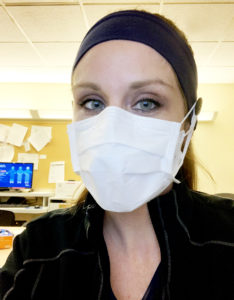HSC alumna left family to work at the epicenter of the COVID-19 outbreak
By Jan Jarvis
Ashley Twining’s first assignment as a physician assistant working in the epicenter of the pandemic was unnerving.
“I was there to take the place of another PA who passed away from COVID-19 only one week earlier,” she said.
That grim reality did not stop the 2012 UNT Health Science Center graduate from leaving her family in Plano to take on a nearly month-long assignment filled with one heart-wrenching moment after another.
During her time in New York City, Twining got several different perspectives of COVID-19 and its impact on patients.
For part of her time there, she worked on an inpatient floor treating critically ill COVID patients.
“Many should have been in ICU, but their prognosis was too poor, and we were trying to just manage them,” she said. “Even with all the interventions that ICU could provide, they were still not likely to survive.”
Twining is among thousands of health professionals who have left their homes and families behind to take care of patients in areas hardest hit by COVID-19. She spoke out on social media because she wanted more people to take the virus seriously and follow social distancing guidelines.
Her stint on the job was constantly demanding and full of despair.
Delivering a grave prognosis to families was a frequent challenge that was especially painful.
“It was hard to convince them that their loved one probably wouldn’t make it,” she said.
But even more painful was being the only human around to hold a patient’s hand as they died, Twining said.
“You see them every day and you feel a connection to them,” she said. “Then they take a turn for the worst, and you know there’s a strong possibility they will pass away and you’re the only one there.”
Working in an emergency department where she admitted patients gave Twining another perspective on the virus.
“The volume of patients coming in the door was just incredible,” she said. “Every patient was very very, sick and all of them with COVID-19.”
Working 12-hour shifts and staying constantly busy left Twining with little time to dwell on how much she missed her husband and two children. When she finally was able to return to Plano, she faced quarantine in an area motel.
That’s when all the trauma she witnessed hit her. She took to Facebook to share a side of COVID-19 that some people were missing, especially in Texas. She spoke out because she wanted more people to take the virus seriously and follow social distancing guidelines.
“A lot of people don’t know anyone who has had COVID-19 here so they assume it’s not that bad,” Twining said. “My intent was to help people see what it’s like because for many, if you don’t see the reality, you don’t understand how deadly this virus is. But more lives will certainly be lost.”







Social media